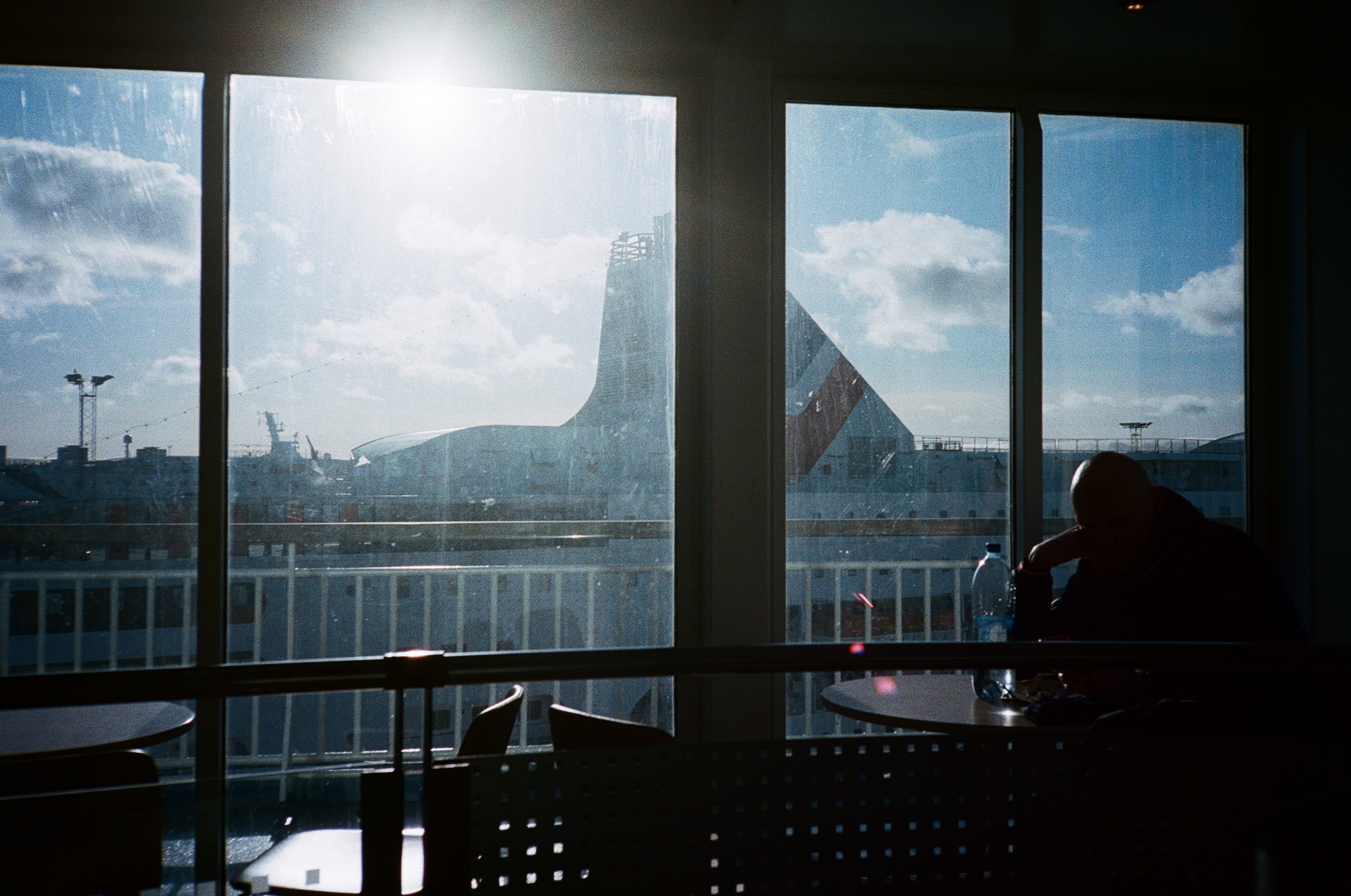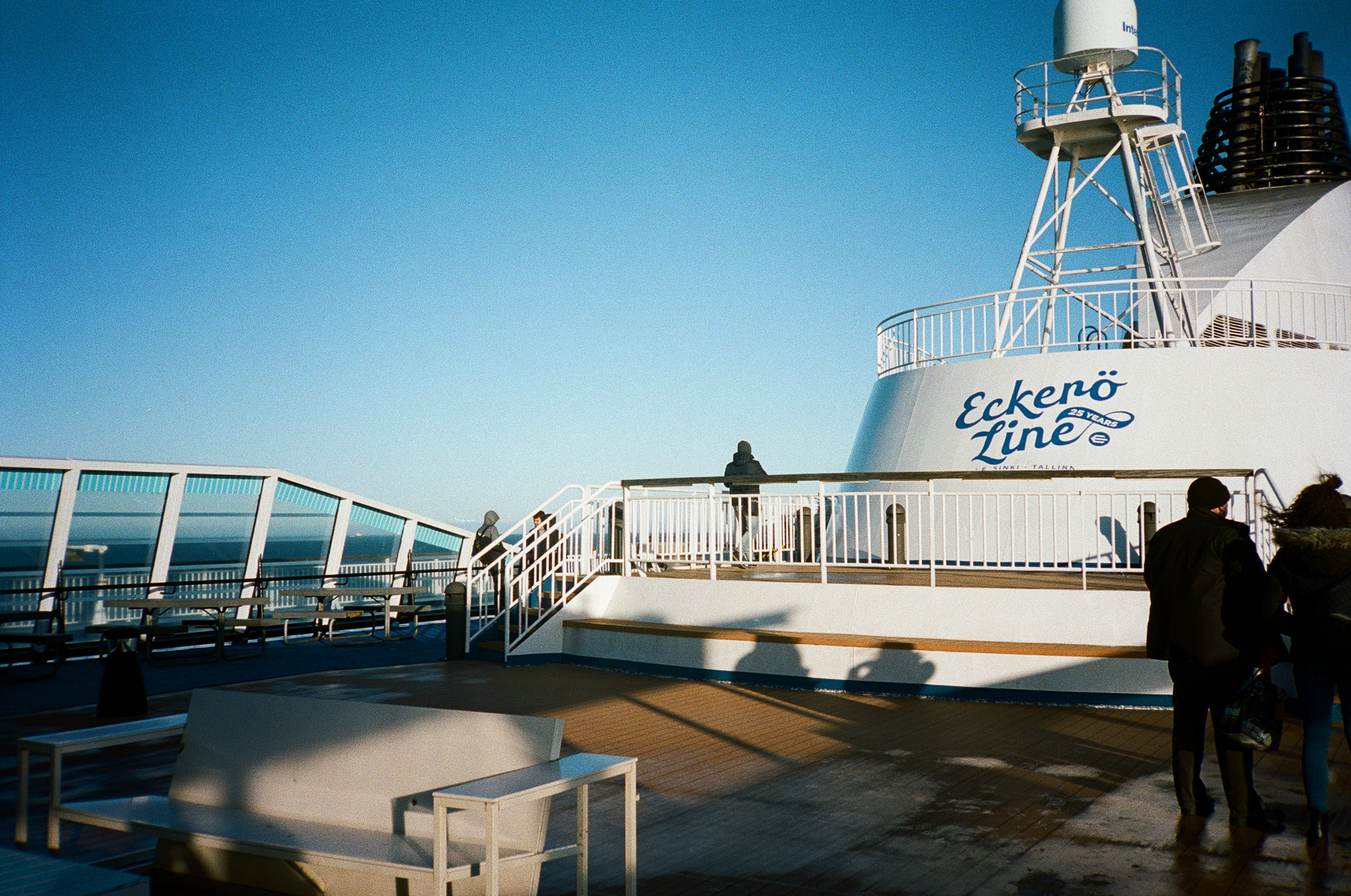Dedicated Elvis
The boat left at eighteen-thirty sharp. It loomed in the
port, illuminated and tall. We had been running late, carrying bags and
backpacks full of booze; an embarrassingly unhealthy assortment of IPA,
sparkling wine and discount vodka. As we hurried, we clinked. We made it through
the gate, our passes barely checked, and up the ramp – which I’m sure is
endowed with an elegantly nautical name – and sighed upon sight of the other passengers
and everyone on board.
We had spent Valentine’s day trekking much of Tallinn – that well-known post-communist city of love – and, although tired, we were both happy.
On the way there, the sea was bright with odd-one-out sunshine; its blue spun, briefly, in all directions with not a sniff of land, and the chug of engines, chimneys spewing into a biting wind. We ate the breakfast she had prepared, and we were in just the right position to get a face full of reflected light. I watched the other passengers. I watched her eat then shared her fork and thought about all her delicious germs. We sat there dozily in the warmth.
But by then the sun had gone and the sea was only an infinity of black. It was the sort of black they kept at the back of the cinema.
The supermarket on board, although caught between customs, was unfairly expensive. Still we perused both the wine and the sweets. She was attracted to the interesting labels, then to the sweets. She recited – to a cent – the price of chocolate onshore and told me we’d be fools to buy it just because it was there—‘Even though that’s a special edition bar of chocolate.’ She was deeply concerned over the chocolate; stood over it, biting her lip and then dancing a little when she’d made up her mind—‘No, we’ll just get some when we land.’ Over the vibration of pistons, the bottles rattled against each other; the whole shop an unsteady choir of glass singers, all at a different pitch so that it sounded, even to the exhausted ear, something quite beautiful and calm.
Three packets of fags per person. She queued and I queued and neither of us would smoke them, but her friend would be most take them one by one outside the gallery, tilting her chin like a sailor as she pulled on each, smoothing her hair and exhaling in long bleached clouds of smoke.
We had spent Valentine’s day trekking much of Tallinn – that well-known post-communist city of love – and, although tired, we were both happy.
On the way there, the sea was bright with odd-one-out sunshine; its blue spun, briefly, in all directions with not a sniff of land, and the chug of engines, chimneys spewing into a biting wind. We ate the breakfast she had prepared, and we were in just the right position to get a face full of reflected light. I watched the other passengers. I watched her eat then shared her fork and thought about all her delicious germs. We sat there dozily in the warmth.
But by then the sun had gone and the sea was only an infinity of black. It was the sort of black they kept at the back of the cinema.
The supermarket on board, although caught between customs, was unfairly expensive. Still we perused both the wine and the sweets. She was attracted to the interesting labels, then to the sweets. She recited – to a cent – the price of chocolate onshore and told me we’d be fools to buy it just because it was there—‘Even though that’s a special edition bar of chocolate.’ She was deeply concerned over the chocolate; stood over it, biting her lip and then dancing a little when she’d made up her mind—‘No, we’ll just get some when we land.’ Over the vibration of pistons, the bottles rattled against each other; the whole shop an unsteady choir of glass singers, all at a different pitch so that it sounded, even to the exhausted ear, something quite beautiful and calm.
Three packets of fags per person. She queued and I queued and neither of us would smoke them, but her friend would be most take them one by one outside the gallery, tilting her chin like a sailor as she pulled on each, smoothing her hair and exhaling in long bleached clouds of smoke.
‘I’m going to see if we can rent a
cabin. Go stand over there, otherwise they might charge us more.’ I went and
stood by the fruity, looked at its colours. A man came along, put in four euro
and made a pretty penny; the thing blitzed and squealed and the coins kept on
falling; he beamed, shouted something I didn’t understand, and walked away. She
came back—‘It’s too expensive. No way I’m paying that. I’ll have to wait to
fuck you.’ Her fingers were beginning to warm.
Between the nautical elegance of the bow and the stern, there was a large seating area with a bar at each end and a small stage in the middle. Above the bar, TV screens rotated deals on beer and coffee & pastries. We sat down on a table for two. She put her thighs between mine, her fingers entwined, her cheekbones close enough for the scent to wash my nose. There were other couples, perhaps two or three, mostly day-trippers with trolleys of booze, a gaggle of rotund businessmen who insisted on announcing their every move with loud exclamations and heavy sighs, a jolly picture each of them. Upon the stage a young man, who held a contract with the shipping line, strummed out popular hits in English and Finnish. Gradually the audience clapped more and more. If my mother were there she would clap enthusiastically because she can’t bear for it to be otherwise. ‘Karaoke in half an hour,’ says I. ‘They’ll go mad,’ she said—‘Finnish people love karaoke.’ Sure enough – after she’d bought us a round – the karaoke started and, with a continental organisation, members of the audience took to the stage. The lyrics were screened on TVs scattered about the large room and behind the lyrics were fading shots of lakes, fields, lilies. Each letter turned from cyan to magenta in time with the music. Nearby the choir of wine bottles sang along, but one had to struggle to hear them. Standing, holding onto the mic for dear life, trembling at the knees and pointed at the monitor, each sung their heart out. Many of the songs I did not understand, switching my attention between the soppy pastime of staring at her, and the incredible amount of accents in the Finnish alphabet, pondering what the words might mean and whether or not the photographs in the background had anything to do with the message of the song. Everyone onboard the ship started singing along, a drunken cacophony, sweetly. She observed and smiled—‘This song is about being so miserable that you can’t get out of bed… This song is about wanting to die… I’m surprised they’re playing this, it’s full of swear words.’ I felt her thighs and wished the cabin had been cheaper.
Between the nautical elegance of the bow and the stern, there was a large seating area with a bar at each end and a small stage in the middle. Above the bar, TV screens rotated deals on beer and coffee & pastries. We sat down on a table for two. She put her thighs between mine, her fingers entwined, her cheekbones close enough for the scent to wash my nose. There were other couples, perhaps two or three, mostly day-trippers with trolleys of booze, a gaggle of rotund businessmen who insisted on announcing their every move with loud exclamations and heavy sighs, a jolly picture each of them. Upon the stage a young man, who held a contract with the shipping line, strummed out popular hits in English and Finnish. Gradually the audience clapped more and more. If my mother were there she would clap enthusiastically because she can’t bear for it to be otherwise. ‘Karaoke in half an hour,’ says I. ‘They’ll go mad,’ she said—‘Finnish people love karaoke.’ Sure enough – after she’d bought us a round – the karaoke started and, with a continental organisation, members of the audience took to the stage. The lyrics were screened on TVs scattered about the large room and behind the lyrics were fading shots of lakes, fields, lilies. Each letter turned from cyan to magenta in time with the music. Nearby the choir of wine bottles sang along, but one had to struggle to hear them. Standing, holding onto the mic for dear life, trembling at the knees and pointed at the monitor, each sung their heart out. Many of the songs I did not understand, switching my attention between the soppy pastime of staring at her, and the incredible amount of accents in the Finnish alphabet, pondering what the words might mean and whether or not the photographs in the background had anything to do with the message of the song. Everyone onboard the ship started singing along, a drunken cacophony, sweetly. She observed and smiled—‘This song is about being so miserable that you can’t get out of bed… This song is about wanting to die… I’m surprised they’re playing this, it’s full of swear words.’ I felt her thighs and wished the cabin had been cheaper.
One of the rotund businessmen stood
up. He was cheered by his friends who all looked the same: doughy,
rosy-cheeked, moustache’d, dressed in large suits. He sung and they sung along
with him until others joined in. Young couples stared and smiled. It was a
pleasant cruise back to the other shore. He raised his hands in the air after
he’d finished, a mic in the stand. The compere appeared, and introduced the
next singer: a middle-aged woman with
short-hair who was out for the day with her friends; they all looked on,
disturbing their straight posture to raucously applaud their fondest! She got
up there and sang Elvis Presley’s I Want You, I Need You, I Love You. At
the chorus everyone joined in, before catching themselves and acknowledging
that she had it all to herself. The sound was spectacular slow and romantic; it
burst out a little from the watermarked windows into the sea’s black ears,
causing it to churn giddy and clap its waves together. After she finished, she
said something in her native tongue and exited the stage to the joy of all her
friends, who cheered and put their hands upon her.
Taking her right hand from mine, laughing, or maybe smiling so much that it became a small laugh, taking a sip of beer—‘She dedicated that song to everyone on Valentine’s Day.’
When the boat docked, the people disembarked wearily with their booze and their trolleys, and got on the trams that had brough them there fourteen hours ago. We stopped by the main station and ordered some food from a small van pushing out Vietnamese fragrances of chili and coriander into the excited night. We carried it home and stunk up the whole bus.
Taking her right hand from mine, laughing, or maybe smiling so much that it became a small laugh, taking a sip of beer—‘She dedicated that song to everyone on Valentine’s Day.’
When the boat docked, the people disembarked wearily with their booze and their trolleys, and got on the trams that had brough them there fourteen hours ago. We stopped by the main station and ordered some food from a small van pushing out Vietnamese fragrances of chili and coriander into the excited night. We carried it home and stunk up the whole bus.

